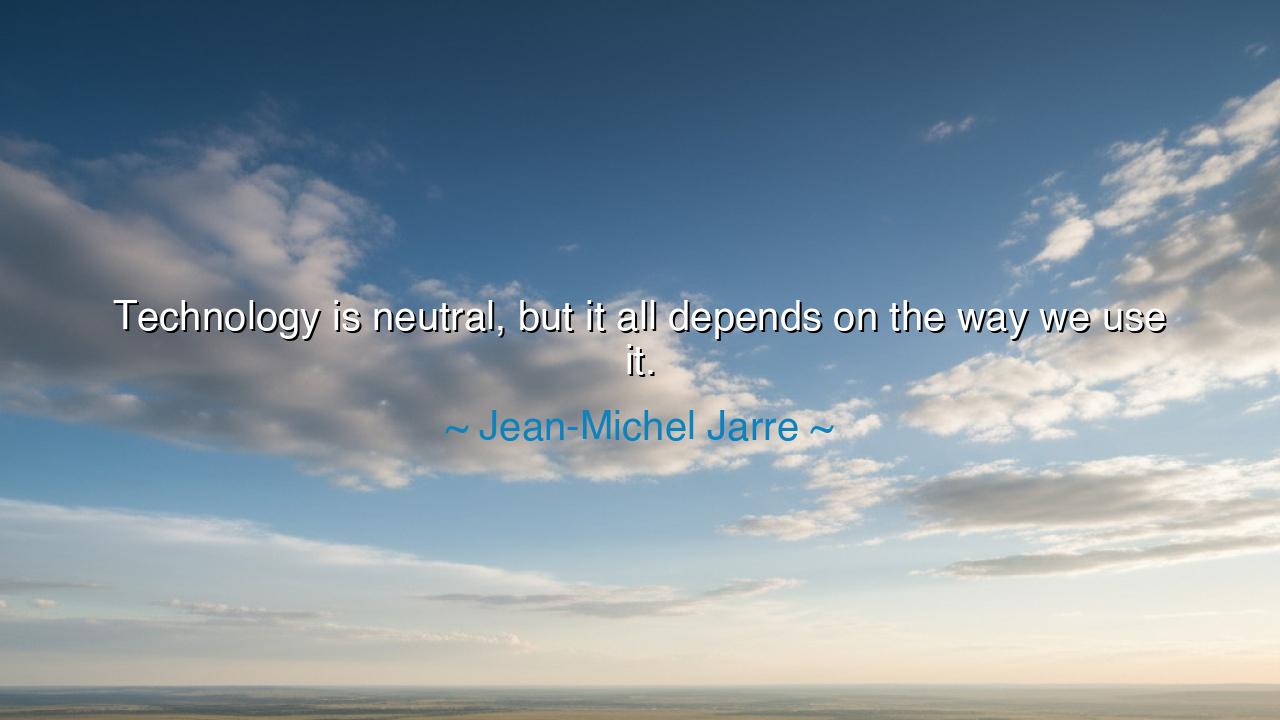
Technology is neutral, but it all depends on the way we use it.






Hear now the words of Jean-Michel Jarre, master of sound and visionary of the modern age: “Technology is neutral, but it all depends on the way we use it.” In this simple truth lies the weight of centuries, for man has ever forged tools with his hands, and with those same tools has chosen either to build or to destroy. The blade that reaps the harvest may also spill blood in war; the fire that warms the hearth may also burn the dwelling to ashes. Thus Jarre reminds us that technology, in itself, is neither angel nor demon—it is the mirror of the heart that wields it.
The origin of this wisdom is ancient, though clothed now in modern garments. From the first stone sharpened by our ancestors, humanity has known that every tool is born in neutrality. It has no will, no conscience, no destiny apart from the hands that guide it. The hammer may raise a cathedral or shatter the same stones into dust. The printing press may spread holy scriptures or venomous lies. The radio may broadcast the music of peace or the poison of propaganda. What matters is not the tool, but the spirit of those who hold it.
Consider the story of Alfred Nobel, the inventor of dynamite. He sought to aid miners and builders, to free them from danger and hasten their labors. Yet his invention was soon taken by armies, twisted into an instrument of death. When Nobel beheld how technology born of his mind was turned against life, he was struck with sorrow. Out of this grief arose the Nobel Prizes, his attempt to bend the legacy of his creation back toward peace. This tale reveals the double path: every tool may walk toward ruin or redemption, depending on the path its wielder chooses.
So too, in our own age, the Internet stands as the clearest testament to Jarre’s words. It is a network vast as the sky, capable of binding mankind together in shared knowledge and fellowship. Through it, wisdom can reach the farthest village, and voices long silenced can be heard. Yet in the same web, darkness lurks: deceit spreads like wildfire, division deepens, cruelty hides behind screens. The neutrality of the machine is never in question—it is always the choice of those who use it.
Thus, the meaning of Jarre’s quote is this: technology is not destiny, but responsibility. It cannot decide for itself; it only magnifies the will of its master. If the heart of man is noble, technology becomes a servant of progress, lifting burdens and healing wounds. If the heart of man is corrupted, technology becomes a tyrant’s whip, a destroyer of peace, a forge of chains. Therefore, every invention is also a test—a mirror that reflects our morality.
The lesson, O children of tomorrow, is clear: do not worship technology as savior, nor curse it as devil. Look instead to yourselves, for you are the hands that wield it, the minds that shape it, the hearts that guide its course. If you would see it serve good, then first purify your own intentions. The tool will follow where you lead, but you must choose the path.
Therefore, let your actions be thus: when you take up a new tool, whether simple or mighty, ask yourself—does this serve creation or destruction, life or death, division or unity? Use technology to heal, not to wound; to enlighten, not to deceive; to unite, not to scatter. For in the end, the neutrality of the machine becomes the morality of the man. And Jarre’s wisdom will prove true: it all depends on the way we use it.






AAdministratorAdministrator
Welcome, honored guests. Please leave a comment, we will respond soon